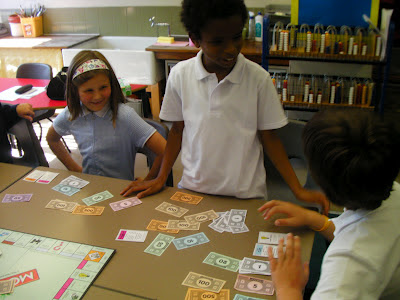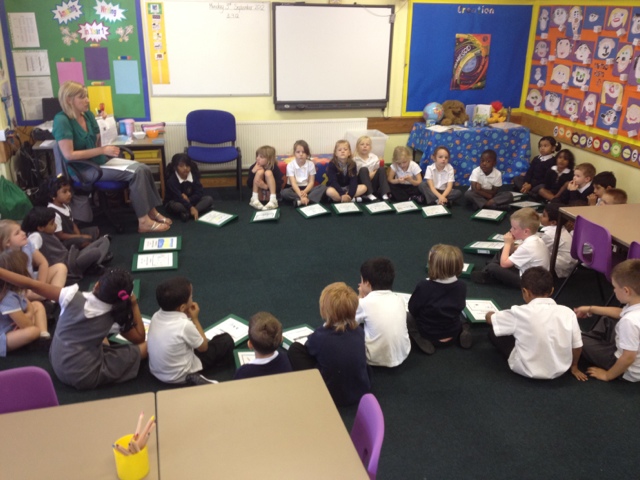St Joe's Blog

Friday, 28 September 2012
Year 6 Shakespeare Workshop
My
Thoughts on the Shakespeare Workshop.
By Maddy
Today, me and my class went to a Shakespeare Workshop, because
our topic is ‘Shakespeare’. A drama writer/director/actor called, Terrific
Toby, did a really good job making us really enthusiastic about everything we
did about, Romeo and Juliet. Although, at the start of the lesson, most of us
didn’t know the meaning of the words we were given, at the end, basically all
of us got to know what they meant.
Throughout the workshop, everybody had a great laugh, learnt
something new and were proud of themselves. My favourite part of the lesson was
the end, because I love acting. Consequently, when we put it all together, it
was fantabulous! (Fantastic &
Fabulous)
Since the workshop, it has made us much more confident to act
in front of everyone, because, when I’m older. I want to be an actress. I hope
we do more activities like this in the future.
Thursday, 27 September 2012
Friday, 21 September 2012
Cost of war
Today for Peace Day some members of Y5C created a picture to highlight the amount of money spent on war. We placed coins over the countries with the biggest military budgets. The higher the budget the more coins we placed down.
Money spent on war
Y5C have been comparing the amount of money countries spend on war. We found out that the richest countries mainly spend the most amount on military budgets. Billions are spent on war each year. For Peace Day we decided to create artwork to highlight the money wasted on war.
Wednesday, 19 September 2012
Money clichés & expressions
For homework Y5C have been collecting examples of clichés and expressions. Today in class we looked at ones that were on the subject of money and discussed their meanings. Here are some of them:
Show me the money
Put your money where your mouth is
pay on the nail
Skills to pay the bills
Time is money
Money is the root of all evil
Money makes the world go round
Another day, another dollar
Filthy rich
In for a penny, in for a pound
Cash in the attic
The best things in life are free
Money can't buy happiness
Costs an arm and a leg
penny for your thoughts
going to spend a penny
Put in your two cents
Money doesn't grow on trees
haven't got a penny to my name
made of money
Quids in
fork out
Kindness costs nothing
Show me the money
Put your money where your mouth is
pay on the nail
Skills to pay the bills
Time is money
Money is the root of all evil
Money makes the world go round
Another day, another dollar
Filthy rich
In for a penny, in for a pound
Cash in the attic
The best things in life are free
Money can't buy happiness
Costs an arm and a leg
penny for your thoughts
going to spend a penny
Put in your two cents
Money doesn't grow on trees
haven't got a penny to my name
made of money
Quids in
fork out
Kindness costs nothing
Assembly - Denise from Ronald McDonald House
This morning it was wonderful to invite Denise from Ronald McDonald House into school. Ronald McDonald House in Bristol does amazing work helping families of sick children. We hope to support their work this year.
Tuesday, 18 September 2012
Rich and poor countries
As part of our project 'Show me the money,' Y5C have been investigating the distribution of rich and poor countries. We found out if a country was rich or poor by looking at the GDP (per capita). We located these countries on a world map and found that most of the rich countries are found in Europe, North America and the Middle East. Most poor countries were located in Africa.
We came up with reasons why countries are poor:
- they are heavily affected by war,
- natural disasters such as drought, floods, earthquakes
- illness and disease e.g. Aids, cholera
- poor education
- dictators/bad leaders
Reasons why countries are rich:
-They make things the rest of the world wants
-They have natural resources e.g. oil, gas
-tourism and banking
-They don't have the same problems as poor countries
- they are heavily affected by war,
- natural disasters such as drought, floods, earthquakes
- illness and disease e.g. Aids, cholera
- poor education
- dictators/bad leaders
Reasons why countries are rich:
-They make things the rest of the world wants
-They have natural resources e.g. oil, gas
-tourism and banking
-They don't have the same problems as poor countries
Slang terms for money
Y5C have been studying information texts in literacy. We undertook work on dictionaries, thesauruses and glossaries.
As part of our project 'Show me the money,' we found lots of different slang terms for money such as:
buck, clam, dosh, dough, loot, bones, coin, lolly, moolah, paper, shrapnel, readies, spondulicks and wonga
A "score" is £20.
A "pony" equals £25.
A "bullseye" is £50.
A "ton" or "century" is £100.
A "monkey" is £500.
A "grand" (or "Bag of Sand") commonly means £1,000
We also looked at cockney rhyming slang and found:
'bread & honey' = money
'taxi driver' = fiver
'Big Ben' = £10
'Nifty' =£50
We enjoyed creating some of our own.
As part of our project 'Show me the money,' we found lots of different slang terms for money such as:
buck, clam, dosh, dough, loot, bones, coin, lolly, moolah, paper, shrapnel, readies, spondulicks and wonga
A "score" is £20.
A "pony" equals £25.
A "bullseye" is £50.
A "ton" or "century" is £100.
A "monkey" is £500.
A "grand" (or "Bag of Sand") commonly means £1,000
We also looked at cockney rhyming slang and found:
'bread & honey' = money
'taxi driver' = fiver
'Big Ben' = £10
'Nifty' =£50
We enjoyed creating some of our own.
Monday, 17 September 2012
Thursday, 13 September 2012
Monday, 10 September 2012
Monday, 3 September 2012
Show me the money!
Today Y5C began their topic 'Show me the money'. During the topic the class will be undertaking a variety of learning on the theme of money. We kicked off the project by playing the game Monopoly. As well as being great fun, the game provided lots of opportunities to improve our maths such as money and calculation skills. We also found out the meaning of vocabulary in the game such as auction, rent and tax.
Subscribe to:
Comments (Atom)

















































